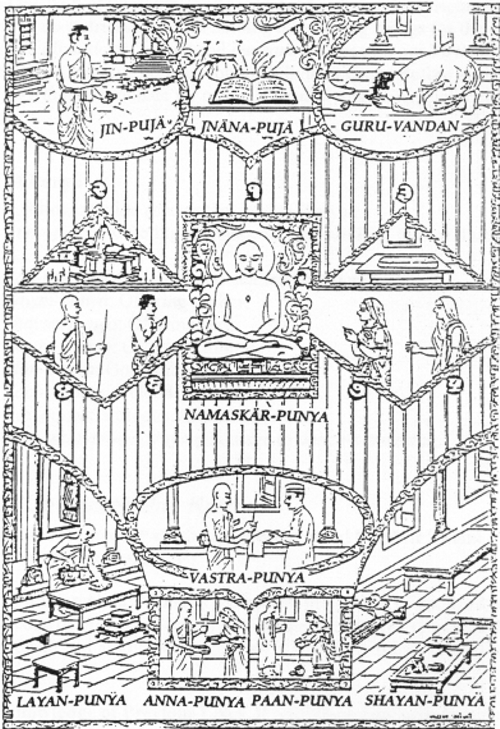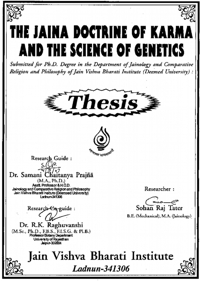Puṇya is wholesome karma and pāpa is unwholesome karma. Their causes of bondage are narrated here.Cause of Bondage of Puṇya
There are following nine aspects that lead to puṇya:Wholesome karma is Puṇya. When one acquires wholesome karmas, it is called Puṇya. One attains mental comforts because of his puṇya. But puṇya does not bring the spiritual happiness. One can get the happiness of heaven because of his puṇya but not the happiness of mokṣa, one attains mokṣa by eradicating both pāpa and puṇya. "Karma is the cause of merit (puṇya) and demerit (pāpa). Good thoughts give rise to merit while evil thoughts to demerit. Those who are possessed of subduced passions have clean mental states, those with intense passions will have unclean mental states.
It all depends on the quality of one's inner aspect (bhāva). Of ones bhāva is wholesome, he will earn puṇya, and if bhāva is unwholesome, he will acquire pāpa. Negative contemplation is pāpa and positive contemplation is puṇya. Many people praise themselves, and that is wrong. The person who praise himself has an intensive ego, one usually reflects out his own attributes. If he is full of faults, he will notice faults in others. Contrary to this, if one has good qualities, he will notice good qualities even in a devil, one who maintains the feeling of revenge for a long time is the person of intensive passions. Attitude of revenge is like a hard knot that is difficult to unite.

Fig. 22: 9 causes of earning puṇya
(1) Anna-puṇyaBy offering of innocent, non-sentient, pure and vegetarian foods to monks and nuns who hold five mahāviratas.(2) Pāna-puṇyaBy offering of non-sentient and pure water of monks and nuns.(3) Layana-puṇyaBy offering shelter to monks and nuns.(4) Śayana-puṇyaBy offering bed (wooden cot) to monks and nuns.(5) Vastra-puṇyaBy offering clothes to monks and nuns.(6) Mana-puṇyaBy good thinking for them.(7) Vacana-puṇyaBy speaking good and kind words for them.(8) Kāyā-puṇyaBy doing virtuous and helpful activities for them.(9) Namaskāra-puṇya
By paying homage to paṅca-parameṣthi.[43]
There are above nine causes mentioned in Sthānāñga Sūtra (a Jaina āgama) that result in earning puṇya. Five of them are related to offering of food, water, shelter, bed and clothes to Jaina ascetics (sañyāsī who practices self restrains) are acts of puṇya. Such offerings are helpful to those who have restored to the spiritual path, good thoughts, good words (speech) and good physical activities are also cause of puṇya. Also paying spiritual homage to pañca-parameṣthi (five supreme entities - Arihañtas, Siddhas, Ācāryas, Upādhyāyas, and Sādhus) is the cause of earning puṇya. The term adopted by most Ācāryas for offering to right people is supātra dāna. Right people include Jaina ascetics as well as the house holders who are practicing self restraints, and are pursuing the path of liberation, and are in need of help. Some Ācāryas interpret that there is no restriction against helping other living beings for the purpose of compassion (jīva-dayā, karunā and anukampā) because our Tīrthankaras donate for one year to all living beings without being selective.
 Prof. Dr. Sohan Raj Tater
Prof. Dr. Sohan Raj Tater
 Doctoral Thesis, JVBU
Doctoral Thesis, JVBU